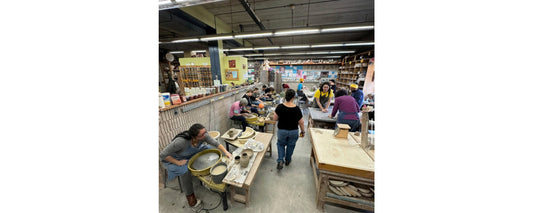“Just make sure my garden looks pretty.” That’s what customers used to say to Nancy DuBrule-Clemente. She had just opened her own garden center, Natureworks, and she wasn’t going to use pesticides to make it happen. At her previous job, “I was spraying really toxic stuff,” she recalls. “I had to suit up and wear a gas mask and basically everything I was spraying is now illegal.”
It was 1983, and the idea of growing flowers and vegetables organically, with attention to the whole biosystem, was almost unheard of. But DuBrule-Clemente was ready to take it on. “Everybody thought I was nuts,” she says.
sponsored by
Take a walk through the colorful, diverse garden at Natureworks today, and you’ll see the evidence of 35 years of labor. This garden is alive not just with plants but with small creatures that help it flourish. An early butterfly flits over the plants in the holding area. A bee clings to the yellow blooms of a baptisia. An orange-crowned bird perches on a garden mobile with a green caterpillar in its mouth.
Natureworks first opened in the Stony Creek section of Branford, where DuBrule-Clemente joined up with some local farmers and a “tight-knit group” of like-minded growers. She moved to her current location in Northford, a repurposed schoolhouse set on one acre fronting Route 22, in 1990. Today the operation has grown to 28 employees, most of them women, including three landscaping crews for hire.
Over time, DuBrule-Clemente saw a “tiny shift” as more organic products began to show up at trade shows. But only recently have local gardeners been catching up. This spring, Natureworks staff have been surprised by the number of young families wanting to learn how to grow their own organic produce. The tiny shift has become what DuBrule-Clemente calls a “sea change.”
“It’s like a reward for having been the nutjob all these years,” she says. “And it was not profitable—at all—to do it that way.
On a sunny Tuesday morning, green wagons are lined up waiting for customers to pull them along the gravel paths between benches of organic vegetables, flowers, ground cover, shrubs. The slogan “Got Milkweed?” is printed on the t-shirts of staff, who are helping customers, stocking benches and watering plants. DuBrule-Clemente is on a mission to get people to grow the right asclepias—the genus of plants, including common milkweed, where monarch butterflies lay their eggs—in their outdoor spaces. The monarchs are disappearing, and one of the causes may be the disappearance of milkweed. Two workshops on raising the butterflies are among the June educational offerings at Natureworks.
Free education is one of DuBrule-Clemente’s specialties. She holds workshops in the garden’s teaching tent, demonstration walks through the garden (including “The June Prune—our most famous walk!”) and a Facebook Live demo every Thursday evening. Chock-full of guidance about what to do that week in their own gardens, an email newsletter arrives in customers’ inboxes every Tuesday. One recent edition included advice on how to deal with the rose sawfly, how to prevent powdery mildew on roses, how to control emerging boxwood leaf miners and how to plant tomatoes.
DuBrule-Clemente pulls no punches when it comes to speaking plant Latin, and she’ll riff on organic pest control for as long as you’ll let her. She jokes that her staff won’t let her out with the customers anymore. “You can read the customer, and some people want to know some pretty technical stuff,” says Natureworks store manager Diane St. John. “Other people just want to know, ‘What should I do? Tell me in two sentences or less.’”
Still, education sneaks in. “We greet you,” DuBrule-Clemente says, “and then we try and teach you.” Last year, she and her staff decided it was time to cut off the supply of some easy-to-grow vegetable seedlings and convince customers to start them from seed. “They were scared,” St. John says. “They didn’t want to do it.” But there was a method to the Natureworks madness. “You don’t want to buy a cucumber plant in the beginning of May and put it in your garden. It’s just an insect-attracting
While all of the veggies at Natureworks are organically grown, many of the flowers and other plants are not because organic versions aren’t commercially available, DuBrule-Clemente says. But when the plants arrive, they’re put on an organic diet. There are other tricks to keeping them happy without toxic chemicals as well—for example, planting certain flowers adjacent to vegetables. “It looks really beautiful,” St. John says, “but it also brings in tons of beneficial insects that take care of the bad insects for you.”
Insights like these are a given at Natureworks, where you won’t find bench upon bench of the usual geraniums, pansies, impatiens and marigolds. Instead, DuBrule-Clemente is likely to pluck a plant off the bench that has an obscure name and looks like nothing special. Then she’ll swear to you that if you take it home and let it bloom, you’ll come back next year looking for more. At the very least, it’s a good bet that your garden won’t look like your neighbors’. “If somebody came to your house, they’d notice that your plants are different,” St. John says.
“Different,” of course, is a compliment here, where DuBrule-Clemente wanders the garden in her purple boots, landing like a butterfly at one plant after another to name it for visitors and extol its virtues. The spray suit is long gone, and Natureworks is blooming.
Natureworks
518 Forest Rd, Northford (map)
Mon-Wed 8:30am-6pm, Thurs 8:30am-7pm, Fri-Sat, 8:30am-6pm; Sun 9am-5pm
(203) 484-2748
www.naturework.com
Written and photographed by Kathy Leonard Czepiel. Image 1 depicts Diane St. John and Nancy DuBrule-Clemente.








